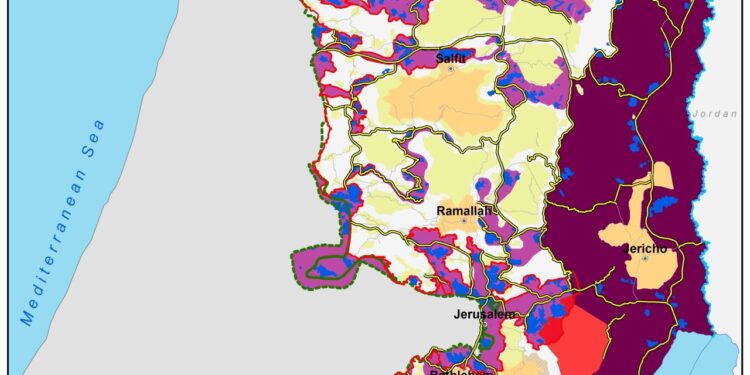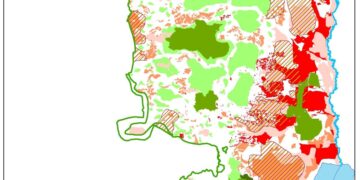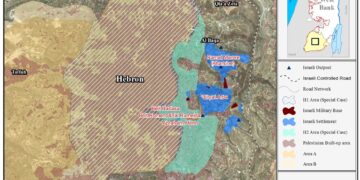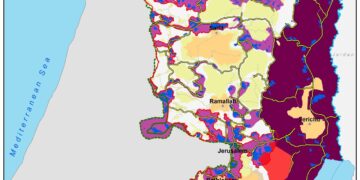The potential annexation of the Jordan Valley by Israel, emboldened by U.S. President Donald Trump’s second term and supported by Prime Minister Benjamin Netanyahu’s far-right coalition, presents a decisive turning point in the Israeli-Palestinian conflict. The Jordan Valley constitutes approximately 30% of the West Bank and is vital to the territorial contiguity, economic viability, and sovereignty of a future Palestinian state. Annexation would not only foreclose the two-state solution but would also intensify instability across the Middle East, jeopardizing regional peace agreements and further undermining international law.
Trump’s First Term Legacy:
During his first term, Trump left a deep imprint on the Israeli-Palestinian conflict by aligning U.S. policy more closely than ever with Israel’s expansionist agenda. On December 6, 2017, he recognized Jerusalem as Israel’s capital and relocated the U.S. embassy, a move that directly defied United Nations Security Council resolutions and decades of international consensus. This was followed by severe financial measures, including the suspension of U.S. aid to the Palestinian Authority and the defunding of UNRWA, the agency supporting millions of Palestinian refugees. The centerpiece of his approach was the so-called “Deal of the Century,” a plan that sought to legitimize Israeli control over large parts of the West Bank while offering Palestinians fragmented autonomy. Though the plan was decisively rejected by Palestinians and dismissed by much of the international community as a maneuver to undercut Palestinians’ right to self-determination, Trump’s policies nonetheless emboldened Israel to accelerate settlement expansion and revive ambitions of annexation.
Trump’s Second Term and Renewed Push for Annexation:
Trump’s reelection in 2024 reinvigorated Israeli ambitions, providing a fresh political umbrella for Prime Minister Netanyahu and his far-right coalition partners to revive plans for annexing the Jordan Valley as part of the broader “Greater Israel” project. This renewed push comes against the backdrop of a growing wave of international recognition of a Palestinian state at the UN General Assembly, which Israel now seeks to counter by accelerating annexation efforts on the ground. For Netanyahu, the combination of Trump’s support and domestic far-right pressure has created a window of opportunity to fortify irreversible “facts on the ground,” directly undermining prospects for a viable two-state solution.
Strategic Importance of the Jordan Valley
Geographically, the Jordan Valley forms the eastern boundary of the West Bank, running along the Jordan River and serving as a natural frontier with Jordan. Its annexation would not only strip Palestinians of access to this strategic river basin but also cut them off from international border crossings, effectively consolidating Israeli control over all external gateways of a future Palestinian state. Such a move would leave any prospective Palestinian entity landlocked, isolated, and dependent on Israel for trade and mobility.
Economically, the Jordan Valley is often described as the “breadbasket of Palestine.” Its fertile soils, favorable climate, and critical access to water resources make it indispensable for agricultural production and food security. For Palestinians, control of this area is vital to building a self-sufficient economy capable of sustaining an independent state. Yet Israeli settlements and agribusinesses already dominate vast portions of the valley, systematically exploiting land and water while marginalizing Palestinian farmers, limiting their cultivation, and restricting access to essential resources. Annexation would reinforce these inequalities, entrenching a system of deprivation that undermines Palestinian livelihoods.
From a security standpoint, Israel frames its control of the Jordan Valley as a military necessity to ensure “defensible borders.” This narrative, however, masks broader strategic goals. The emphasis on security serves to justify territorial expansion, demographic reengineering, and the long-term exclusion of Palestinians from their land. Rather than genuine defense, annexation reflects Israel’s pursuit of permanent control and its vision of an altered territorial reality in which a sovereign Palestinian state is rendered geographically fragmented and economically unviable.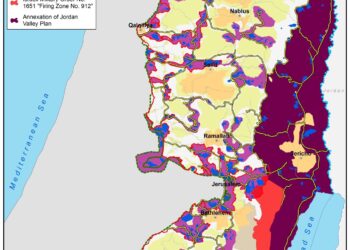
Risks and Ramifications of Annexation
- Collapse of the Two-State Solution: Annexation of the Jordan Valley would fragment the West Bank into isolated enclaves, destroying the territorial contiguity necessary for a viable Palestinian state. The longstanding international consensus on two states based on the 1967 borders would effectively be nullified, rendering the two-state solution unachievable and reinforcing permanent Israeli control over key Palestinian lands.
- An Apartheid Reality: Palestinians residing in annexed areas would face severe restrictions on residency, loss of land, and exclusion from civil and political rights, intensifying the de facto apartheid system. Human rights organizations, including Amnesty International and Human Rights Watch, have already categorized Israeli practices as apartheid; annexation would formalize and intensify this systemic inequality.
- Economic Devastation: Annexation would deprive Palestinians of fertile agricultural lands and vital water resources, undermining farming, increasing unemployment, and deepening economic dependency on Israel. This would prevent the development of a self-sustaining Palestinian economy and perpetuate chronic humanitarian crises across the West Bank.
- Regional Instability: Jordan, sharing the eastern border of the Jordan Valley, views annexation as a direct threat to its national security and demographic balance. Such a move could destabilize the 1994 Israel-Jordan peace treaty, provoke unrest in neighboring Arab states, and inflame regional tensions, threatening broader stability in the Middle East.
- International Law and Diplomatic Fallout: Annexation would constitute a clear violation of the UN Charter, the Fourth Geneva Convention, and multiple UN Security Council resolutions, including 242 and 338. It would likely strain U.S.-Europe relations, isolate Washington diplomatically, and trigger global calls for sanctions or accountability measures against Israel.
- Radicalization and Escalation of Violence: Palestinians are likely to interpret annexation as the definitive end of meaningful negotiations, fueling anger, protests, and potential militant responses. The legitimacy of the Palestinian Authority could erode further, undermining internal governance and jeopardizing security coordination with Israel, potentially escalating cycles of violence.
Broader Implications
- Shift Toward a One-State Reality: Annexation would consolidate Israeli control over the West Bank, effectively creating a permanent one-state reality marked by Jewish supremacy and Palestinian subjugation. This could revive calls for equal rights within a single democratic state, directly challenging Israel’s self-definition as both Jewish and democratic.
- Impact on Gaza and Wider Conflict Dynamics: The move would reinforce Palestinian perceptions in Gaza that negotiations are futile, likely fueling cycles of conflict and reducing prospects for durable ceasefires or reconciliation.
- Global Governance at Stake: Permitting annexation without accountability would undermine the credibility of the international system, weakening the authority of international law in addressing territorial disputes and conflicts worldwide.
Conclusion
Annexing the Jordan Valley would mark a decisive rupture in the Israeli-Palestinian conflict, extinguishing the two-state solution and cementing a regime of permanent occupation and apartheid. With U.S. backing under Trump’s second presidency, Israel may feel emboldened to proceed. However, the costs; diplomatic, economic, and security-related, would vibrate far beyond the Jordan Valley, destabilizing the Middle East and undermining the international legal order.
Preventing annexation requires urgent, coordinated action by the international community to uphold international law, preserve the possibility of peace, and protect the rights of the Palestinian people.
Prepared by:
The Applied Research Institute – Jerusalem


